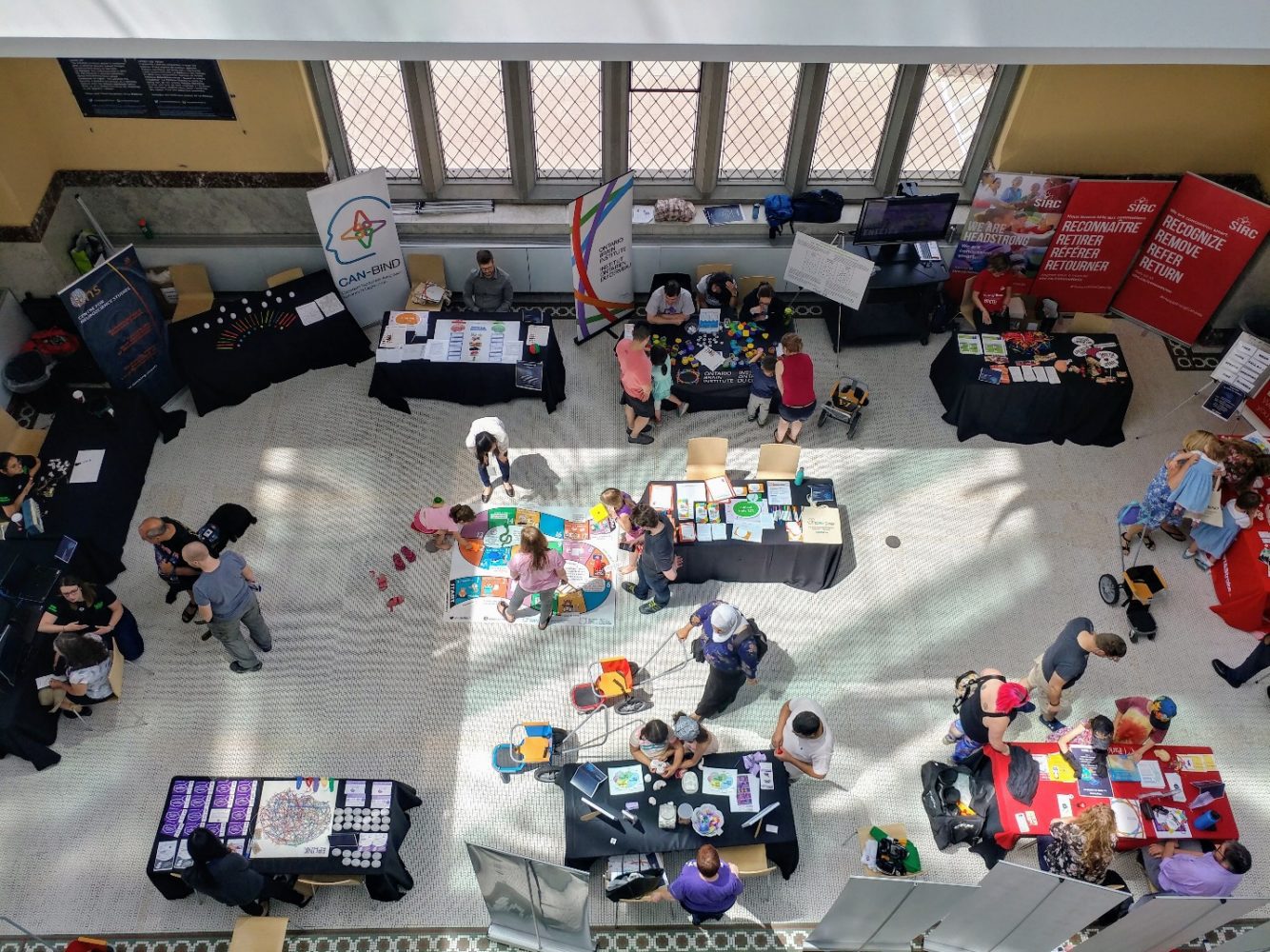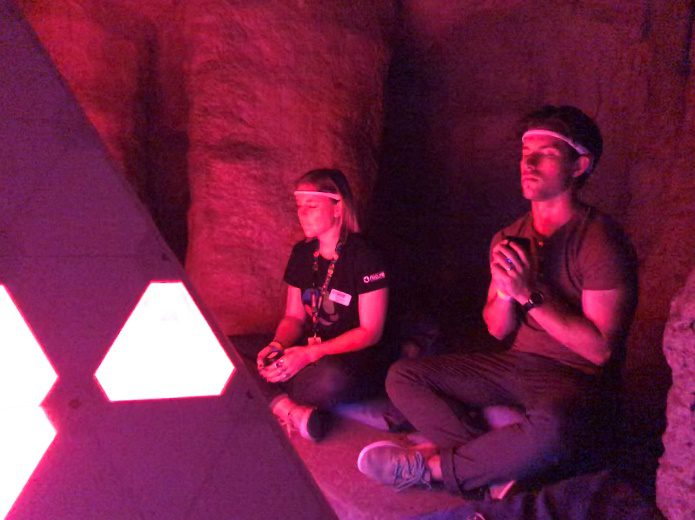It’s June 2018 and I’m standing in the rotunda of the Canadian Museum of Nature, watching hundreds of people walk from booth to booth and speak with Ontario researchers, neurotechnology companies and non-profit organizations like Epilepsy Ottawa. As the Director of Knowledge Translation and Outreach at the Ontario Brain Institute, I’m here because OBI has brought these researchers, companies and charities in to participate in a five-month partnership with the Museum of Nature to complement its feature exhibition, “Brain: The Inside Story.” It’s amazing to see the work we do behind the scenes—driving the impact of research by helping Ontario scientists share data with each other, integrating the lived experience of patients and their advocates, and supporting commercialization activities—come to life this way, to see the way it matters to people and the high degree of interest they are showing.

Ontario researchers, companies and charities showcasing their work to Canadian Museum of Nature patrons at Brain Bonanza
Rewind to 2014, when the OBI was approached by the Ontario Science Centre (OSC) with a proposal to become a “knowledge sponsor” for the same exhibition, which originated at New York’s Museum of Natural History and was making its maiden voyage north of the border. This was the first we had heard of knowledge sponsorship, a type of partnership where an organization offers funding and access to experts in exchange for increased visibility and access to a large public audience. OBI has a mandate for public outreach and empowering people with actionable information about brain health, but because our office consists of 25 cubicles in a downtown Toronto tower, opportunities to engage the public do not come our way very often. We saw the partnership with the OSC as an opportunity to reach thousands of Ontarians.
From November 2014 through March 2015, OBI set up shop at the OSC. We hosted educational play-based activities for children, interactive installations that allowed people to participate in live research, science field trips for First Nations youth, and even Cafés Scientifique (e.g., Dr. Carol Greenwood spoke about the effects of diet on brain health in a kitchen while a chef prepared brain-healthy food), all with the goal of exposing the public to the work of OBI’s neuroscience community. The result was that we gained access to 160,000 people, and the OSC was able to offer their patrons an enriched experience.
So when the Canadian Museum of Nature (CMoN) approached us to be a knowledge sponsor we readily agreed. We worked closely with the CMoN staff to plan five different events that would unfold between May and September 2018. Some were similar to what we did with the OSC, but a few were new. For example, we organized a set of four free public talks that focused on brain and nature (e.g., medical marijuana, and Indigenous mental health and connection to the land). We also invited companies to set up their cool neurotechnologies at the CMoN’s Nature Nocturne where people explore the galleries after hours with music and mingling. Two Ontario companies, Interaxon and Nanoleaf, partnered on an installation that allowed visitors to wear brain-sensing headbands that controlled large LED panels—hundreds of people took turns sitting around a pyramid of LED panels, trying to meditate and control the colours in the room. Finally, we partnered with the CMoN staff to develop a mini-exhibition featuring interactive stations that teach us how to take care of our brain health (e.g., sleep hygiene, eating well, being physically active).
Our showcase event, Brain Bonanza, took place over a weekend in June and featured Ontario’s neuroscience excellence. CMoN goers could meet the team from Bruyère Research Institute who were featuring the Motoview exercise bike and virtual reality display. (The technology is designed to help older adults with dementia get physical activity, work on balance and enjoy their virtual surroundings, such as a bike down the Champs de Mars toward the Eiffel Towel.) A large group of school kids joined a live “Dancing with Parkinson’s” class and learned about how moving your body to music can help people with a brain disorder. The Carleton Society for Neuroscience Ottawa team taught people how the brain perceives and processes information by allowing them to control a robotic claw with their own brain signals. Brain Bonanza also included several 15-minute public talks, including one by a young woman with cerebral palsy who spoke about “the F words” (function, family, fitness, fun, friends, future) of disability, and how they helped her overcome adversity and ultimately fulfill her dream of getting accepted to medical school.
Working with organizations in different cities has allowed OBI to engage with hundreds of thousands of people. We were mentioned as the sponsor in all the OSC’s and CMoN’s promotional materials and we were featured in media coverage in the Globe and Mail, Toronto Star, CP24, and others, as well as in social media, school programming, signage and exhibition space, and by the organization’s leaders in their speaking engagements. Dr. Maurice Bitran (CEO of the OSC) regards our work together as the gold standard for partnership.
Overall, the outreach to date is estimated to have led to 54 million views of content related to the exhibition, the partnership, OBI and its community. We saw an overall doubling of our online audience. Our subscriber list increased by 138 percent and we grew the number of followers across our main social media channels (Twitter, 72 percent; Facebook, 71 percent; YouTube, 221 percent; LinkedIn, 176 percent). Additionally, we saw a 30 percent increase in our web traffic compared with the same time in the previous year.
As we prepare for our final few public talks at CMoN, I think back to the crowds of people stopping to meet neuroscientists, neurotechnology companies, and patient advocacy organizations—with a genuine interest in the work they do—and I am grateful for the terrific partnerships we’ve had with the OSC and CMoN. I’m sure there will be more to come.
A special thank you to the OBI working group and the leadership of Jenine Paul for ensuring the success of these knowledge partnerships.



The comments section is closed.
What a great program for sharing and educating.